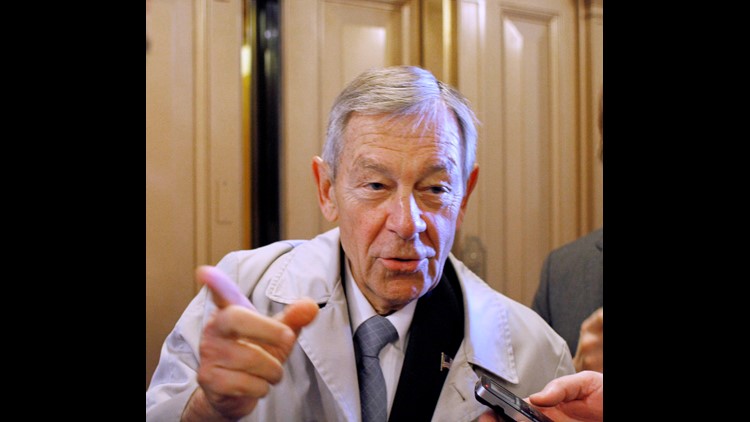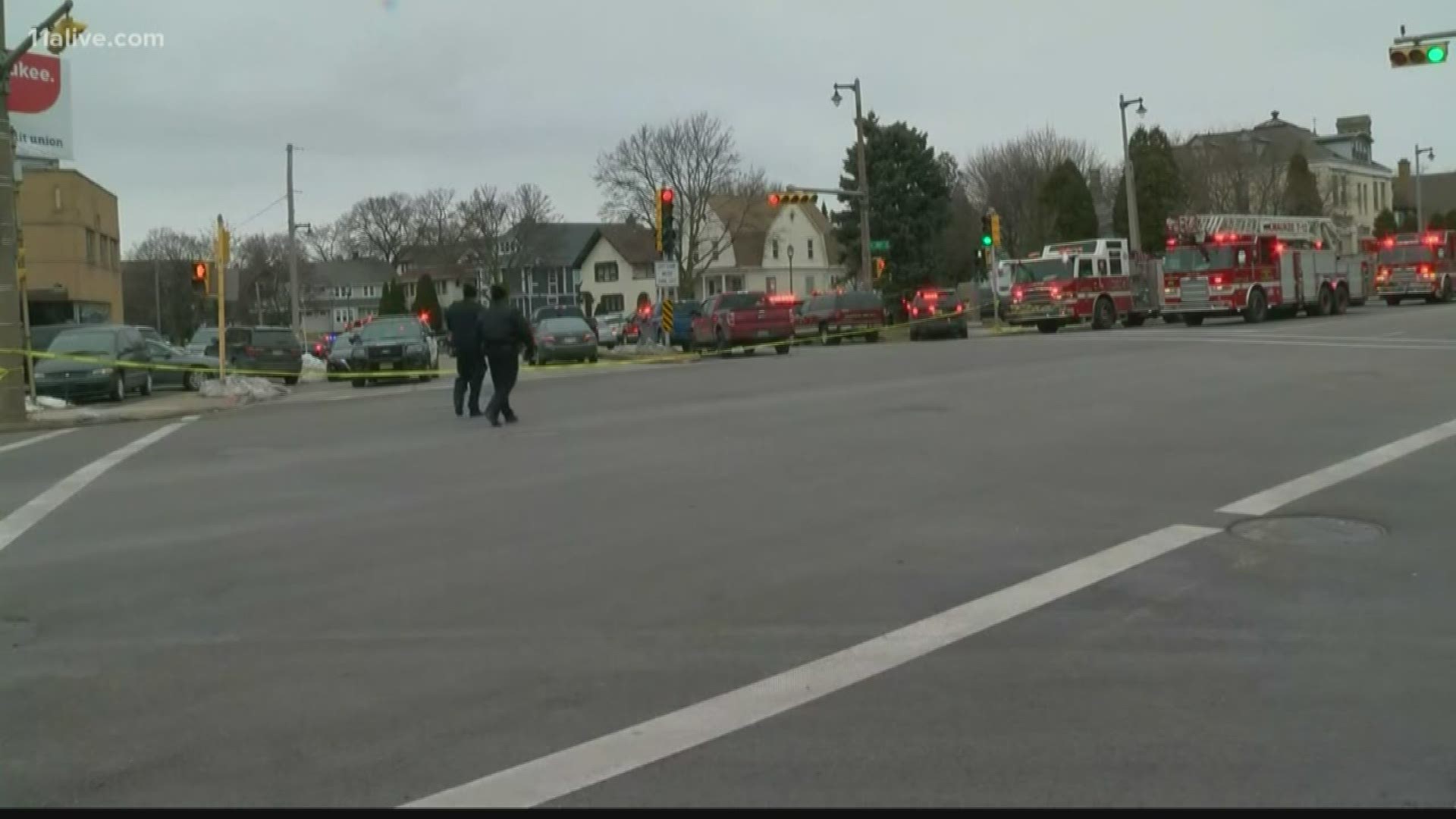![george_voinovich_061216 [image : 85789432]](http://www.gannett-cdn.com/media/2016/06/12/USATODAY/USATODAY/636013286039358284-george-voinovich-061216.jpg)
CINCINNATI — George Voinovich, a Republican who mixed fiscal prudence with political moderation during his nearly half-century in public service in Ohio, died Sunday.
Voinovich served two terms as Ohio governor in the 1990s and two terms in the U.S. Senate, capping a political career that started in 1963 and led him to the Cleveland mayor's office on his way to the governor's office and Washington. He was 79.
The news shook friends and supporters across the state, with remembrances pouring in from Democrats and Republicans alike.
“He was a unifier who thought outside the box, never gave up and worked hard for the ideas he believed in up until the very end of his life," Ohio Gov. John Kasich, said in a statement. "Thanks to that leadership he saved Cleveland, governed Ohio compassionately and responsibly and was a candid voice for reason in the U.S. Senate."
David Pepper, chairman of Ohio's Democratic Party and former Cincinnati city councilman, recalled giving then-senator Voinovich a tour of Cincinnati.
"It was clear he was still a mayor at heart," said Pepper. "He didn’t miss a detail, and that’s what a great public servant does — focuses on the details and brings people together to find solutions."
![Voinovich to retire in 2010 - USATODAY.com [oembed : 85789440] [oembed : 85789440] [oembed : 85789440] [oembed : 85789440]](/Portals/_default/Skins/PrestoLegacy/CommonCss/images/smartembed.png)
Voinovich was deeply religious, believing that everyone had God-given gifts, recalled Ohio Attorney General Mike DeWine. He took home work every night and weekend as governor. And though he was a "city kid," he loved the Ohio State Fair.
"His administrative style and philosophy were to hire good people, hold them accountable, but let them run their departments," DeWine recalled in the statement.
Voinovich earned a reputation as a tightwad during his years in office, especially as governor from 1991 to 1999.
He shined his own shoes, bought his clothes on sale, and when he learned public money was used to buy snacks served on state airplanes, he banned the snacks. He also sold one of the state's airplanes.
![Ohio Gov. John Kasich [pullquote : 85789672]](/Portals/_default/Skins/PrestoLegacy/CommonCss/images/pullquote.jpg)
"He would send me some four-color glossy brochure some state agency did and say, 'What's this for? Put it on a piece of white paper and shoot it through the printer,' " said Greg Browning, who was Voinovich's budget director, according to Cincinnati Enquirer archives.
When he was elected mayor of Cleveland in 1979, the city had defaulted on its loans and was in fiscal ruin. Voinovich raised taxes and balanced the books. He ran for governor in 1990, saying he would bring the same fiscal discipline to the state budget.
"It is not an exaggeration to say he personally saved the city from default and revived the spirit of Cleveland through sheer force of will, an unyielding work ethic and an infectious optimism," said Republican Rob Portman, who succeeded Voinovich in the Senate.
As governor, he cut $720 million from the budget in two years. In Congress, Voinovich continued government penny-pinching, backing legislation for a new round of military base closures and opposing repeal of the estate tax.
Over his 12 years in the Senate, Voinovich occasionally found himself at odds with his fellow Republicans. He was an early supporter of a proposed federal bailout for the auto industry, which employs thousands of people in Ohio, and he was the rare Republican during the Bush administration to suggest raising taxes to pay for the war in Iraq and hurricane relief.
He also become one of the first Republicans to call for a withdrawal from Iraq — a move that "prompted a near brawl with fellow Republican John McCain of Arizona during one closed-door meeting in 2007," according to Congressional Quarterly's political almanac.
Voinovich also opposed President Obama's $787 billion economic stimulus package, saying it was weighed down by too much spending that wasn't stimulative.
Twice elected to the Senate, Voinovich announced in early 2009 that he would not run again in 2010. He said he wanted to retire to spend more time with his family and at his condo on Florida's Gulf Coast. He also planned to write a book and agreed to be a consultant and adviser on major research projects at Ohio University and Cleveland State University.
As he left office, he counted among his accomplishments the passage of a global anti-Semitism bill, an effort to expand NATO and a bill to protect intellectual property. He also touted what he called a "nuclear renaissance," pushing to make it easier for nuclear power plants to get new licenses and financing, and to improve the oversight of the Nuclear Regulatory Commission.
Sen. Sherrod Brown, D-Ohio, who served in the Senate with Voinovich, called him "a man of strong conviction" who "was always willing to listen to the other side of an argument." His legacy, Brown said, "will live on in the lasting contributions he made to our city and our state.”
Voinovich's death came as a surprise to friends. He died peacefully in his sleep, his wife Janet confirmed.
The grandson of immigrants who grew up on Cleveland's east side, Voinovich had delivered public remarks Friday at a 25th Slovenian Independence Day event at Cleveland City Hall. He was a delegate to the Republican National Convention coming to Cleveland next month.
In June 2003, doctors implanted a cardiac pacemaker because his heart rate had slowed down over several years because of a condition called progressive sinus bradycardia and Voinovich had experienced various health challenges in recent years.
The Voinovich file
Name: George V. Voinovich
Age: 74; born July 15, 1936
Hometown: Cleveland
Education: B.A., Ohio University, 1958; J.D., Ohio State University, 1961
Political experience: Ohio assistant attorney general, 1963-64; Ohio House of Representatives, 1966-71; Cuyahoga County Auditor, 1971-76; Cuyahoga County Commissioner, 1977-78; Ohio lieutenant governor, 1979; Cleveland mayor, 1979-89; Ohio governor, 1990-98; U.S. senator, 1999-2010.
Contributing: The Associated Press. Follow Deirdre Shesgreen and The Cincinnati Enquirer on Twitter: @dshesgreen and @Enquirer



